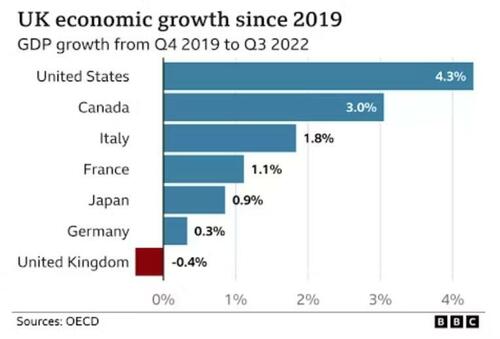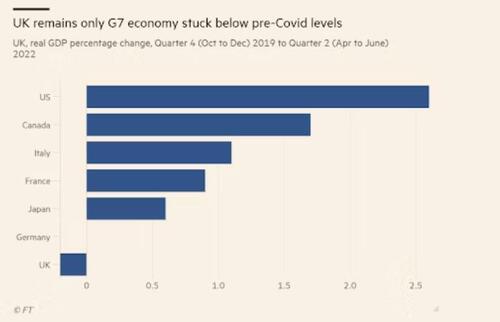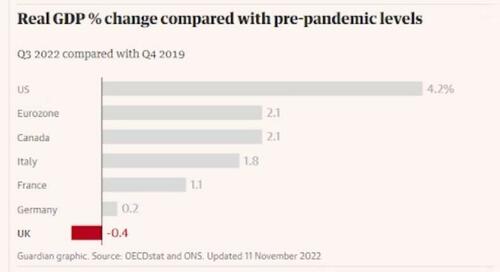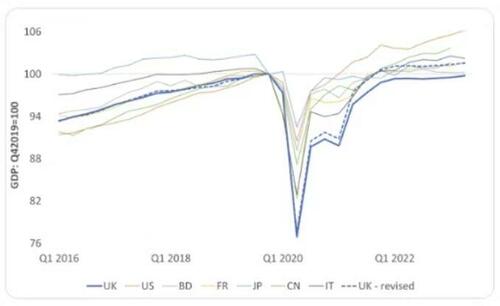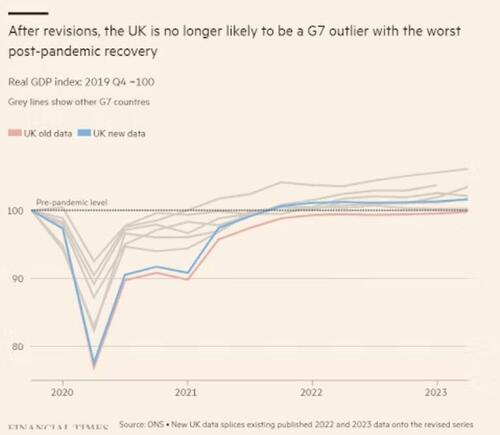
Authored by Derrick Berthelsen via The Critic,
By now we all “know” that Brexit has had an enormous detrimental effect on the UK economy. We ‘know’ this because the MSM and various “independent experts” have continually told us so.
Take the BBC who in their January 2023 article entitled “What impact has Brexit had on the UK economy?” included the chart below to argue that Brexit is the cause of the UK’s failure to grow GDP above pre covid levels:
Or the FT which published a similar chart to blame Brexit for the failure of the UK economy to return to pre Covid levels and who in their article entitled “UK economy set to be one of the last to recover from pandemic” were quick to emphasise that Brexit was the cause:
And of course the Guardian who in their piece “How Britain’s economic woes stack up against Europe’s — a close look at the figures” relied on the same graphic:
CNN, Politico and many others made exactly the same point about the failure of UK GDP to recover and how it was all a result of Brexit.
The argument was clear.
Brexit could be proven to be the culprit for the UK’s weak economic performance post the covid outbreak because only the UK had left the EU and only the UK of all of the G7 had failed to see GDP return to pre covid levels.
However, today the ONS published updated estimates of UK GDP, in part to adjust for the different way the UK accounts for health spending vs the rest of the G7, which they state shows that the UK economy has actually performed much more strongly than previously calculated since Covid.
The main changes they highlight are:
-
Annual current price gross domestic product (GDP) growth in 2021 is revised up 0.9 percentage points to an 8.5 per cent increase; this follows an unrevised fall of 5.8% in 2020.
-
Annual volume GDP growth in 2021 is revised up 1.1 percentage points to an 8.7% increase; this follows an upwardly revised 10.4 per cent fall in 2020 (previously an 11% fall).
-
Upward revisions to annual volume GDP growth in 2020 and 2021 mean that GDP is now estimated to be 0.6 per cent above pre-coronavirus (COVID-19) pandemic levels in Quarter 4 (Oct to Dec) 2021; previously this was estimated as 1.2% below.
-
In 2021, the services sector is now estimated to have grown by 10.9 per cent, revised up by 3.9 percentage points. Annual services growth has also been revised up in 2020 by 0.5 percentage points.
These changes, as Simon French, @shjfrench the Chief Economist and head of Research at investment bank Panmure Gordon tweeted are “extraordinary”, adding:
“The entire UK economic narrative — post-pandemic — has just been revised away.”
He continued:
“Every ‘UK not back at pre-CV-19 level’ headline (is) now obsolete. ‘UK bottom of the G7’ no longer true.”
He could (and probably should) have added, that the same is true of every claim of a Brexit inspired economic collapse.
Simon also posted the chart below comparing G7 members GDP performance since Q4 2019 with the previous ONS UK GDP estimates and the new revised figures.
As you can see, all signs of a Brexit inspired collapse in UK GDP growth have simply disappeared:
Independent Economist Julian Jessop tweeted that the “revised @ONS data show that UK #GDP recovered to pre-Covid levels in 2021, roughly 18 months earlier than previously thought… Maybe #BrexitBritain isn’t such a laggard after all?”
John Burn-Murdoch of the FT tweeted “Vibe shift, economic data edition: After the latest GDP revisions, turns out the UK economy had recovered to its pre-pandemic size by the end of 2021, has recovered more strongly than Germany, and roughly as strongly as France.
He also quoted FT Economics Editor Chris Giles (who has been extremely vocal in his negative view on the economic cost of Brexit): “Per @ChrisGiles_ calculations, by the end of 2021, UK recovery was behind only the US and Canada!”
A point that has also been made by City AM in their article “Doomsayers ‘proved wrong’: UK had third-fastest Covid recovery in G7, revised GDP data now shows”
Indeed in its article published today on the ONS data changes entitled “UK Covid-era economic performance better than previously stated”, the FT writes that the “Statistical agency’s revisions put Britain’s post-pandemic recovery in line with G7 peers” stating that “revised figures (have) added nearly 2 per cent to the size of the economy.”
It continues to state that:
The revisions suggest the UK no longer has the worst growth record among G7 countries since 2019. They are also likely to show Britain performing better than Germany, Europe’s biggest economy, once they are included in official figures in October.
Quite a change….
Some of us have been arguing for years that the cries of a Brexit economic catastrophe were overdone and driven by an ideological aversion to the UK leaving the EU rather than the economic reality.
Whether it was the OBR ignoring the importance of estimates for immigration and productivity in their forecasts for lower GDP growth from leaving the SM and CU. Or the FT failing to look at the export data fully, and misrepresenting inflation, business investment, GDP data in order to drive an anti Brexit economic narrative. Or the Centre for European Reform’s doppelganger model failing to sanity check their modelled outcome with the estimates of both the gains to the UK economy of SM membership and the economic performance of the whole of Europe versus the US.
All these arguments of a huge negative economic effect from Brexit have been simply blown out of the water by the ONS today.
Not that I think this means the UK economy is performing well. Quite the opposite. The whole of Europe is struggling with issues of poor productivity and lack of investment — in no small amount driven by ludicrous energy policies which are inevitably leading to de-industrialisation and economic decline.
But as the ONS has demonstrated today, Brexit is simply not a primary cause or major factor in our economic weakness. But taking advantage of our new found post-Brexit freedoms may well be a very big part of the solution.
Authored by Derrick Berthelsen via The Critic,
By now we all “know” that Brexit has had an enormous detrimental effect on the UK economy. We ‘know’ this because the MSM and various “independent experts” have continually told us so.
Take the BBC who in their January 2023 article entitled “What impact has Brexit had on the UK economy?” included the chart below to argue that Brexit is the cause of the UK’s failure to grow GDP above pre covid levels:
Or the FT which published a similar chart to blame Brexit for the failure of the UK economy to return to pre Covid levels and who in their article entitled “UK economy set to be one of the last to recover from pandemic” were quick to emphasise that Brexit was the cause:
And of course the Guardian who in their piece “How Britain’s economic woes stack up against Europe’s — a close look at the figures” relied on the same graphic:
CNN, Politico and many others made exactly the same point about the failure of UK GDP to recover and how it was all a result of Brexit.
The argument was clear.
Brexit could be proven to be the culprit for the UK’s weak economic performance post the covid outbreak because only the UK had left the EU and only the UK of all of the G7 had failed to see GDP return to pre covid levels.
However, today the ONS published updated estimates of UK GDP, in part to adjust for the different way the UK accounts for health spending vs the rest of the G7, which they state shows that the UK economy has actually performed much more strongly than previously calculated since Covid.
The main changes they highlight are:
-
Annual current price gross domestic product (GDP) growth in 2021 is revised up 0.9 percentage points to an 8.5 per cent increase; this follows an unrevised fall of 5.8% in 2020.
-
Annual volume GDP growth in 2021 is revised up 1.1 percentage points to an 8.7% increase; this follows an upwardly revised 10.4 per cent fall in 2020 (previously an 11% fall).
-
Upward revisions to annual volume GDP growth in 2020 and 2021 mean that GDP is now estimated to be 0.6 per cent above pre-coronavirus (COVID-19) pandemic levels in Quarter 4 (Oct to Dec) 2021; previously this was estimated as 1.2% below.
-
In 2021, the services sector is now estimated to have grown by 10.9 per cent, revised up by 3.9 percentage points. Annual services growth has also been revised up in 2020 by 0.5 percentage points.
These changes, as Simon French, @shjfrench the Chief Economist and head of Research at investment bank Panmure Gordon tweeted are “extraordinary”, adding:
“The entire UK economic narrative — post-pandemic — has just been revised away.”
He continued:
“Every ‘UK not back at pre-CV-19 level’ headline (is) now obsolete. ‘UK bottom of the G7’ no longer true.”
He could (and probably should) have added, that the same is true of every claim of a Brexit inspired economic collapse.
Simon also posted the chart below comparing G7 members GDP performance since Q4 2019 with the previous ONS UK GDP estimates and the new revised figures.
As you can see, all signs of a Brexit inspired collapse in UK GDP growth have simply disappeared:
Independent Economist Julian Jessop tweeted that the “revised @ONS data show that UK #GDP recovered to pre-Covid levels in 2021, roughly 18 months earlier than previously thought… Maybe #BrexitBritain isn’t such a laggard after all?”
John Burn-Murdoch of the FT tweeted “Vibe shift, economic data edition: After the latest GDP revisions, turns out the UK economy had recovered to its pre-pandemic size by the end of 2021, has recovered more strongly than Germany, and roughly as strongly as France.
He also quoted FT Economics Editor Chris Giles (who has been extremely vocal in his negative view on the economic cost of Brexit): “Per @ChrisGiles_ calculations, by the end of 2021, UK recovery was behind only the US and Canada!”
A point that has also been made by City AM in their article “Doomsayers ‘proved wrong’: UK had third-fastest Covid recovery in G7, revised GDP data now shows”
Indeed in its article published today on the ONS data changes entitled “UK Covid-era economic performance better than previously stated”, the FT writes that the “Statistical agency’s revisions put Britain’s post-pandemic recovery in line with G7 peers” stating that “revised figures (have) added nearly 2 per cent to the size of the economy.”
It continues to state that:
The revisions suggest the UK no longer has the worst growth record among G7 countries since 2019. They are also likely to show Britain performing better than Germany, Europe’s biggest economy, once they are included in official figures in October.
Quite a change….
Some of us have been arguing for years that the cries of a Brexit economic catastrophe were overdone and driven by an ideological aversion to the UK leaving the EU rather than the economic reality.
Whether it was the OBR ignoring the importance of estimates for immigration and productivity in their forecasts for lower GDP growth from leaving the SM and CU. Or the FT failing to look at the export data fully, and misrepresenting inflation, business investment, GDP data in order to drive an anti Brexit economic narrative. Or the Centre for European Reform’s doppelganger model failing to sanity check their modelled outcome with the estimates of both the gains to the UK economy of SM membership and the economic performance of the whole of Europe versus the US.
All these arguments of a huge negative economic effect from Brexit have been simply blown out of the water by the ONS today.
Not that I think this means the UK economy is performing well. Quite the opposite. The whole of Europe is struggling with issues of poor productivity and lack of investment — in no small amount driven by ludicrous energy policies which are inevitably leading to de-industrialisation and economic decline.
But as the ONS has demonstrated today, Brexit is simply not a primary cause or major factor in our economic weakness. But taking advantage of our new found post-Brexit freedoms may well be a very big part of the solution.
Loading…
